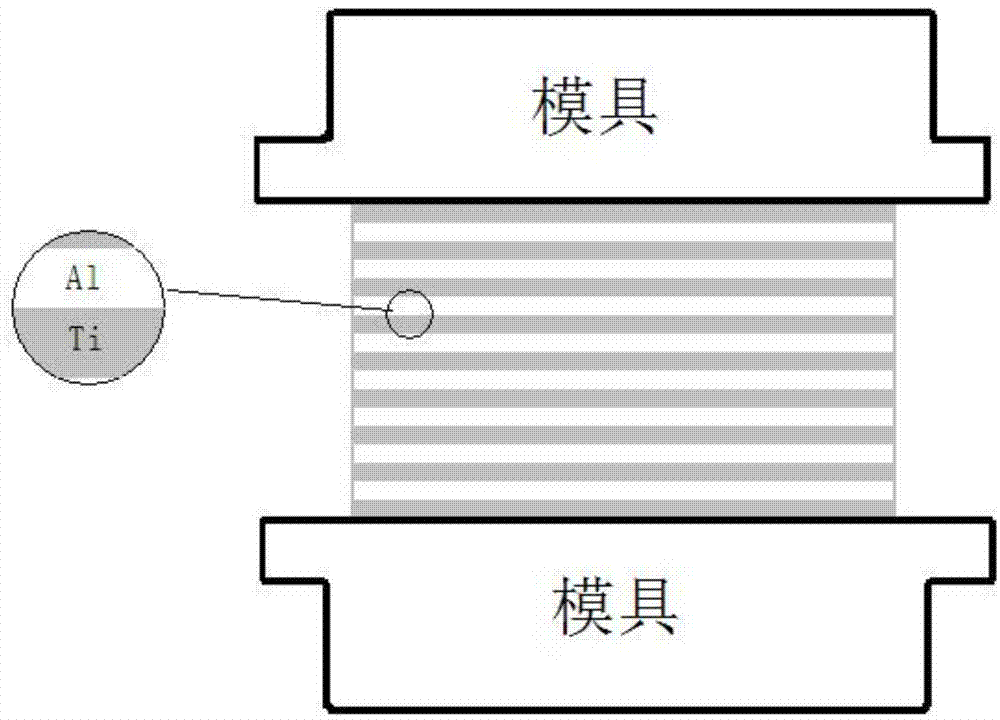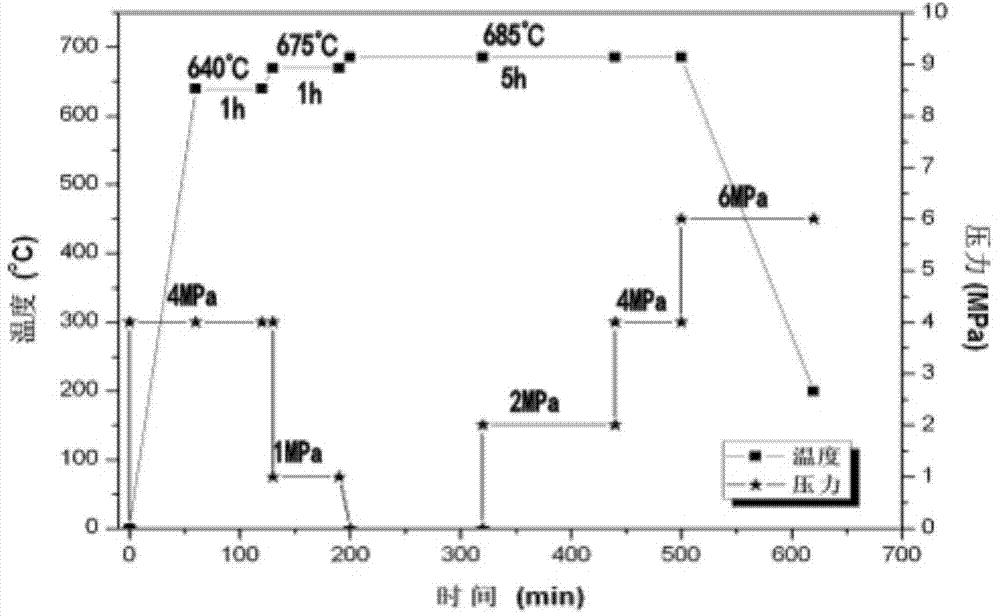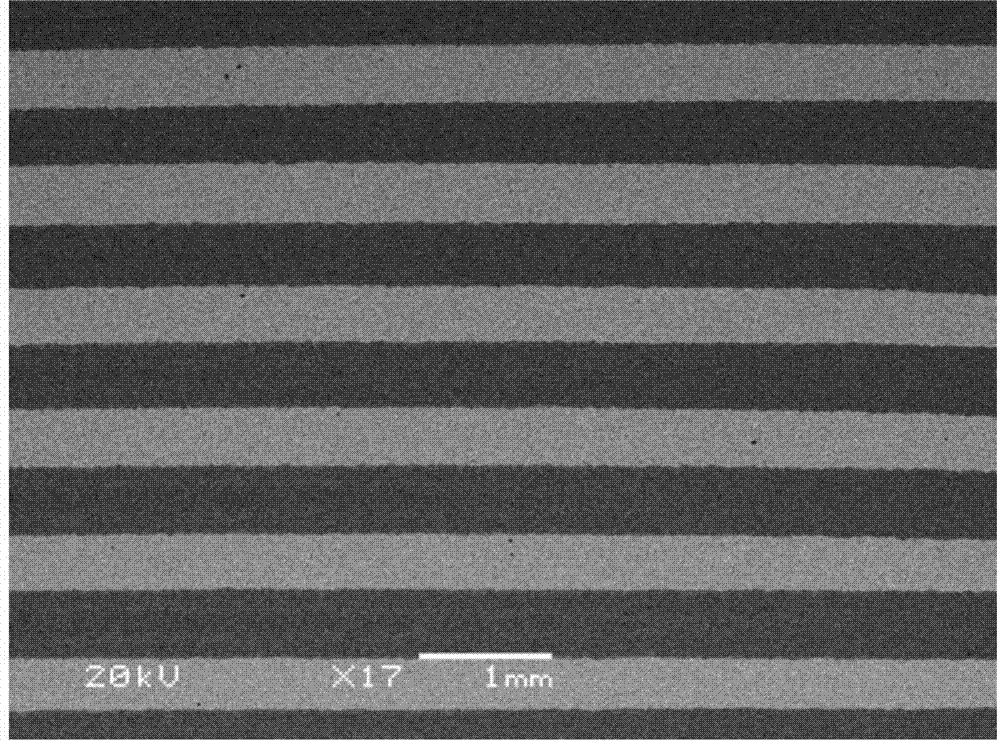Preparation method of light-weight intermetallic compound based layered composite material
A technology of intermetallic compounds and composite materials, which is applied in the field of preparation of composite materials, can solve problems such as poor production safety, environmental impact, and large smog, and achieve the effects of high hardness, high interface bonding strength, and low density
- Summary
- Abstract
- Description
- Claims
- Application Information
AI Technical Summary
Problems solved by technology
Method used
Image
Examples
example 1
[0039] Pretreatment of the surface of the raw material: Choose Ti foil and Al foil with thicknesses of 520μm and 620μm, and cut the metal foil into 100mm×100mm squares for surface pretreatment. First, use sandpaper to clean the surface of Ti foil and Al foil. Polish to remove the oxide scale on the surface until the fresh surface is exposed, and then treat the polished Ti foil and Al foil with ultrasonic for 15-20 minutes. Finally, clean the surface with alcohol to remove the remaining oxide particles and impurities, and then air dry. Put it into the drying dish to be processed.
[0040] The two foils are overlapped with each other. The number of layers of Ti foil and Al foil is 14 and 13 respectively, and the outermost layer is Ti foil, and the final number of layers is 27. See the attached figure 1 .
[0041] Put the above-mentioned metal foil laminate into a graphite mold in a vacuum hot pressing furnace for vacuum hot pressing and sintering. The background vacuum degree is 6.67...
example 2
[0044] Compared with Example 1: The surface pretreatment process of the material and the composition of the material, the thickness of the layer, the number of layers and the stacking method are exactly the same, but the process parameters of the vacuum hot pressing are different.
[0045] The vacuum hot pressing process of Example 2 is shown in the attachment Figure 5 :The background vacuum is 6.67×10 -3 Pa, heat up to 640°C at a heating rate of 10°C / min for 1 hour, then heat up to 675°C at a heating rate of 3.5°C / min, hold for 1 hour, and then heat to 685°C / min at a heating rate of 1°C / min, Keep for 7h. During the heating process and the 640°C holding stage, a pressure of 4MPa was applied. During the 675°C holding stage and the 685°C holding stage, the pressure was not applied for the first 2 hours, and the pressure was applied at the last 5 hours of the 685°C holding stage.
[0046] This sintering and 40%Ti / Al 3 The difference in Ti sintering process is that the holding time is...
example 3
[0049] Compared with Example 1: The surface pretreatment process of the metal foil is exactly the same, and the composition of the original material remains unchanged. The thickness of the Ti foil remains unchanged. The thickness of the Al foil used is 840μm. The number of Ti foil and Al foil is adjusted to 13 and 12 respectively. The surface-treated metal foils are overlapped and the outermost end is Ti layer.
[0050] The heat treatment process used in Example 3 is the same as that in Example 2, and the process parameters are shown in the attachment Figure 5 .
[0051] For the microstructure of the composite material prepared in Example 3, see attached Figure 7 . After measurement, Ti layer and Al 3 The thickness of the Ti layer is 240μm and 960μm, and the volume percentage of the reinforcement Ti in the composite material is 20%. This sample is named 20%Ti / Al 3 Ti. The composite material after the hot-pressing treatment was subjected to a compression experiment, and the mech...
PUM
| Property | Measurement | Unit |
|---|---|---|
| Thickness | aaaaa | aaaaa |
| Average yield strength | aaaaa | aaaaa |
| Thickness | aaaaa | aaaaa |
Abstract
Description
Claims
Application Information
 Login to View More
Login to View More - R&D
- Intellectual Property
- Life Sciences
- Materials
- Tech Scout
- Unparalleled Data Quality
- Higher Quality Content
- 60% Fewer Hallucinations
Browse by: Latest US Patents, China's latest patents, Technical Efficacy Thesaurus, Application Domain, Technology Topic, Popular Technical Reports.
© 2025 PatSnap. All rights reserved.Legal|Privacy policy|Modern Slavery Act Transparency Statement|Sitemap|About US| Contact US: help@patsnap.com



